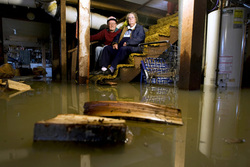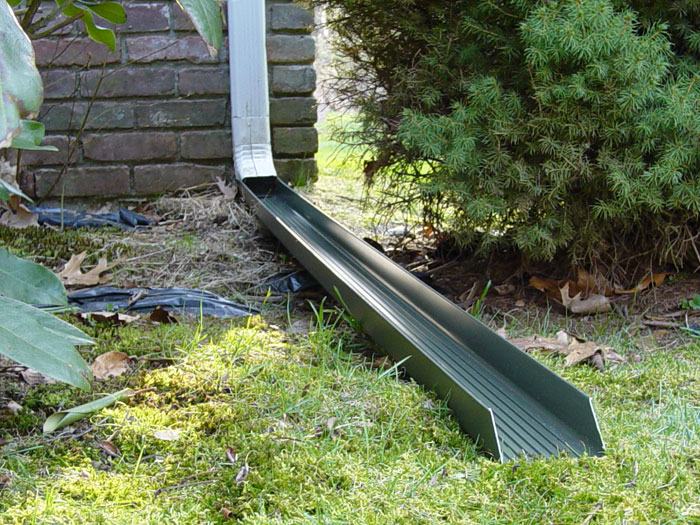
Multiple problems can arise from leaks that penetrate their way through pipes or into basement walls and result in a consistently wet basement. Mold and bacteria can begin to fester, rotted housing materials become an issue, and consistent dampness can make it necessary for people to move from their homes if the problem is not solved. Taking assertive action to control basement wetness is a great way to protect and maintain the investment you have in your home.
Take Preventative Cautions to Avoid Wet Basement Problems
Performing a regular examination of your basement and the foundation and outskirts of your home is the best way to avoid having a leak that quickly expands and turns into an irreparable or highly-expensive problem. Inspecting the following areas will help homeowners to stay on top of any potential leakages that may affect the basement.
1) Walk through your basement and pay close attention to wet walls or smells of dampness. Many times, when water leaks in from the outside, the water will run straight down the walls and pool behind the walls or spill into the flooring next to baseboards and cause dampness and warping of wood and other materials. Identifying this quickly will help you to control the problem and determine an appropriate and swift solution.
2) Check for dips in lawn or flower beds outside your home just next to the walls. This can be a sign of water leaking into the basement. Basement waterproofing steps can be taken right away if you discover that the lawn or soil outside your home’s foundation is dropping low.
What You Can Do to Protect Your Basement
Gutters are highly-recommended for every home. Gutters and water collectors, also known as downspouts, help to collect and drain the water on your roof from heavy rains away from the house and into the surrounding lawn. This is a great preventative step to take to help maintain your home and protect several areas of your home from major leaks and water invasion.
If you notice problems around the soil directly outside your home, landscaping and realigning the soil to a position where it slopes away from the house can work wonders. If soil slopes towards the house, this causes slow build-up of water that can seep along your basement walls and into the exterior of your home through the basement. Investing in a professional landscaping service to arrange the soil so it slopes away from the home can potentially save you a significant amount of money in the future.
Avoid putting landscaping rocks and bricks around the edge of your home. While this is a popular landscaping technique used by many homeowners, the landscaping rock or brick can contain extra water close to the house. Eventually, the contained water stands a good chance of seeping down the house walls and into the basement.
Photo credits: http://www.omnibasementsystems.com
http://www.reclaimedhome.com
Take Preventative Cautions to Avoid Wet Basement Problems
Performing a regular examination of your basement and the foundation and outskirts of your home is the best way to avoid having a leak that quickly expands and turns into an irreparable or highly-expensive problem. Inspecting the following areas will help homeowners to stay on top of any potential leakages that may affect the basement.
1) Walk through your basement and pay close attention to wet walls or smells of dampness. Many times, when water leaks in from the outside, the water will run straight down the walls and pool behind the walls or spill into the flooring next to baseboards and cause dampness and warping of wood and other materials. Identifying this quickly will help you to control the problem and determine an appropriate and swift solution.
2) Check for dips in lawn or flower beds outside your home just next to the walls. This can be a sign of water leaking into the basement. Basement waterproofing steps can be taken right away if you discover that the lawn or soil outside your home’s foundation is dropping low.
What You Can Do to Protect Your Basement
Gutters are highly-recommended for every home. Gutters and water collectors, also known as downspouts, help to collect and drain the water on your roof from heavy rains away from the house and into the surrounding lawn. This is a great preventative step to take to help maintain your home and protect several areas of your home from major leaks and water invasion.
If you notice problems around the soil directly outside your home, landscaping and realigning the soil to a position where it slopes away from the house can work wonders. If soil slopes towards the house, this causes slow build-up of water that can seep along your basement walls and into the exterior of your home through the basement. Investing in a professional landscaping service to arrange the soil so it slopes away from the home can potentially save you a significant amount of money in the future.
Avoid putting landscaping rocks and bricks around the edge of your home. While this is a popular landscaping technique used by many homeowners, the landscaping rock or brick can contain extra water close to the house. Eventually, the contained water stands a good chance of seeping down the house walls and into the basement.
Photo credits: http://www.omnibasementsystems.com
http://www.reclaimedhome.com

 RSS Feed
RSS Feed